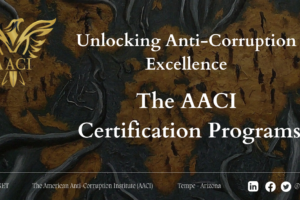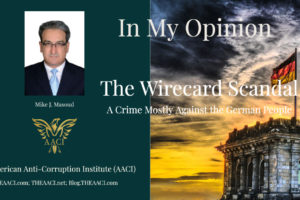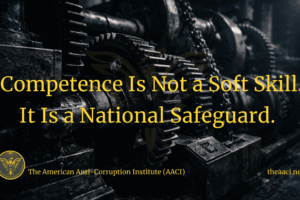As The American Anti-Corruption Institute’s (AACI) journey approached five years since launching its operations in late 2012, fraud and corruption scandals continued to make headlines. Though the Volkswagen Dieselgate costs exceeded $30bn to date, and Samsung’s CEO will spend time in prison for corruption charges, the corporate world does not seem to be paying attention. Corruption removed several heads of states from power, in South Korea, Brazil, a senator in the United States, UN officials and Ambassadors and, EU officials.
Despite the setbacks, or maybe because of the exposure, the global political landscape became more determined than ever to fight graft. For the first time, the United States equated the efforts of combating corruption to the fighting financing terrorism.
Fighting corruption has, in fact, became a prerequisite to fighting financing terrorism. Amid the global turmoil of corruption, the media and public relations of The AACI met Mr. L. Burke Files, the president of The AACI, at its headquarter in Tempe, Arizona to discuss The AACI’s global efforts in fighting corruption, among other relevant issues.
The AACI: On behalf of our members, constituents, and advocates worldwide, we thank you Mr. Files for this opportunity to answer our questions.
Files: You are most welcome.
The AACI: As you know, corruption is a prevalent phenomenon hitting all over the world. How do you evaluate the commitment of the international community to fighting corruption?
Files: The 1977 Foreign Corrupt Practice Act, The United Nations Convention against Corruption (2005), the UK 2010 Bribery Act and those of the OECD relevant anti-corruption demonstrate an unprecedented global commitment to unequivocally fighting corruption. The most explicit U.S. message in this regard came at the May 2016 London anti-corruption summit where John Kerry, the former US Secretary of State said: “We are fighting a battle, all of us. Corruption, writ large, is as much of an enemy, because it destroys nation states, as some of the extremists we are fighting or the other challenges we face.” This proclamation changed the global landscape for fighting corruption. It tied, in public, for the first time, combating terrorism and combating corruption.
“This proclamation changed the global landscape for fighting corruption. It tied, in public, for the first time, combating terrorism and combating corruption.”
The AACI: Why does The AACI focus all its efforts on executive management and those charged with governance?
Files: To answer your question, let me remind you that our founders are visionaries and responded strategically to the financial crises of 2008. The financial meltdown of 2008 shocked us though we had SOX and all the other relevant laws. When you read the report of THE NATIONAL COMMISSION ON THE CAUSES OF THE FINANCIAL AND ECONOMIC CRISIS IN THE UNITED STATES, you will find the crises was 100% avoidable. Further, that corporate of America suffered from significant weakness at the top. We found that the “tone at the top” was severely weak and at best sickened from significant lack of anti-corruption intelligence and short-term visions. We believe that the Board Of Directors and Executive Management must possess the minimum required anti-corruption knowledge and skills to enable them to meet their duties. As of today, The AACI is the only organization all over the world that targets decision makers to help them deter, prevent, and detect fraud and corruption through the methodical management anti-corruption certification program Certified Anti-Corruption Manager (CACM).
“The AACI is the only organization all over the world that targets decision makers to help them deter, prevent, and detect fraud and corruption through the methodical management anti-corruption certification program Certified Anti-Corruption Manager (CACM). “
The AACI: What do you mean by anti-corruption intelligence?
Files: The AACI coined it to mean the minimum, optimum knowledge a decision maker should have to avoid fraud and corruption intelligently. Such knowledge includes the proper blend of due diligence, internal controls, anti-corruption, governance, decision making, process auditing ( from a management perspective and duties) to avoid anti-corruption and fraud. By avoidance, we emphasize the concept of deterrence and prevention. Corruption prevention is less expensive and better than any cure.










































